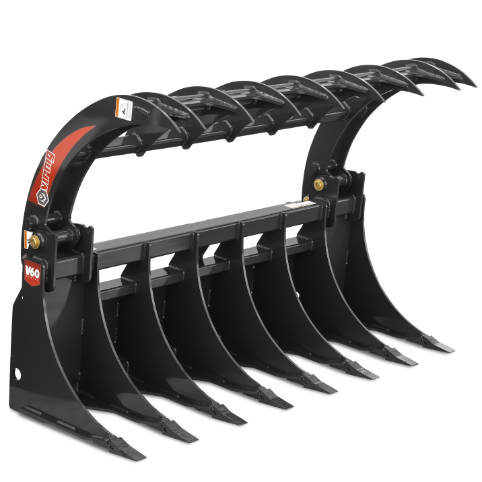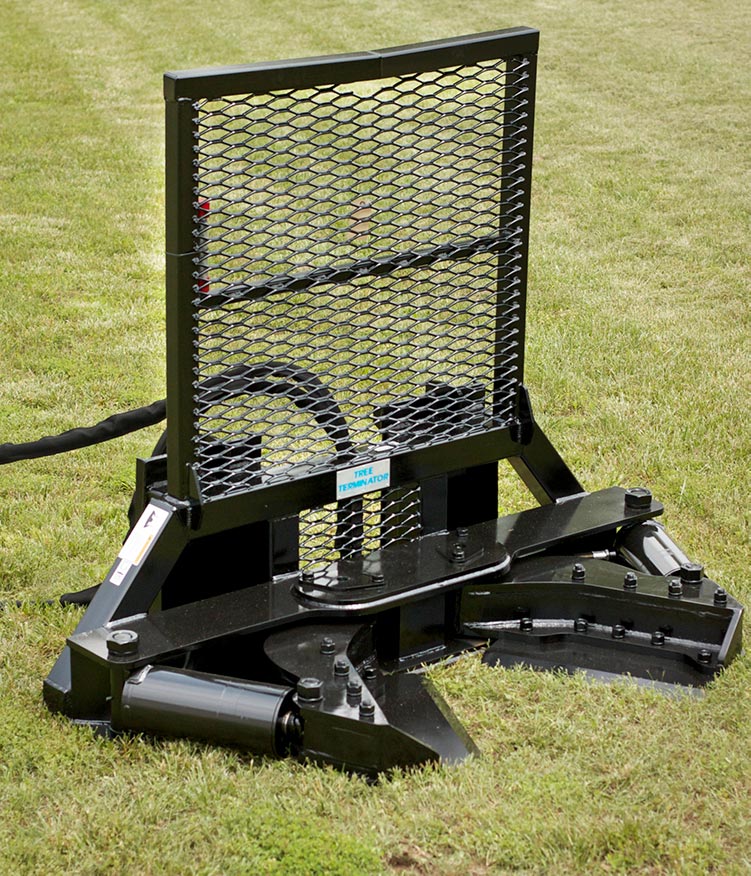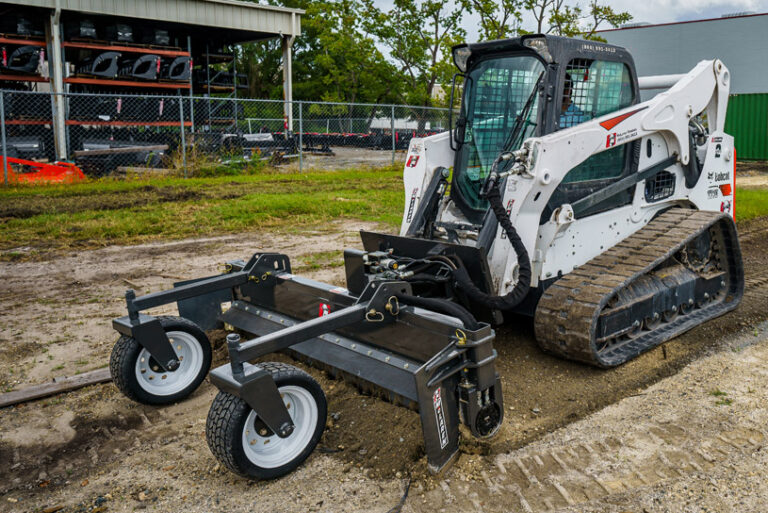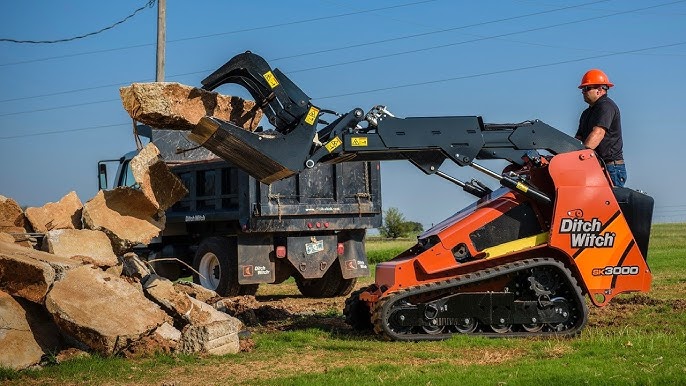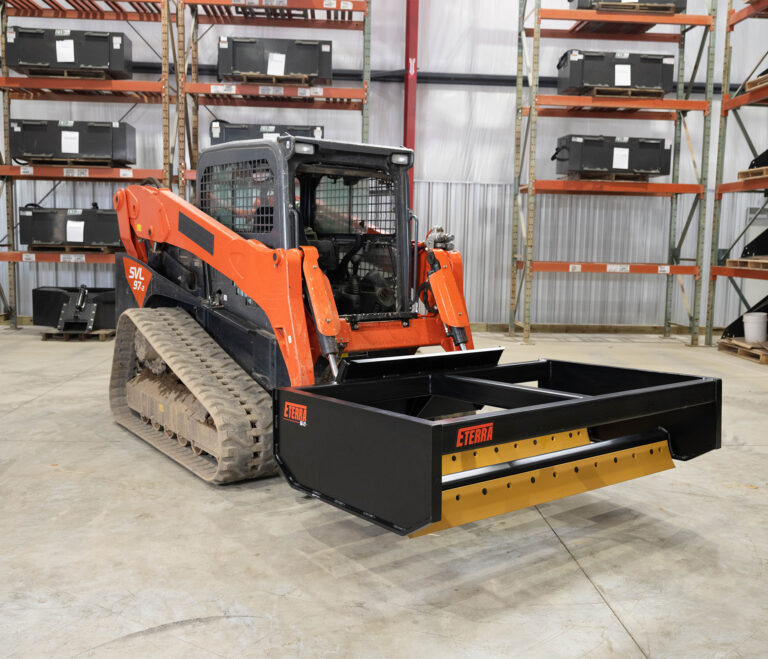Skid Steer Box Blade: Ultimate Tool for Efficient Grading
A skid steer box blade is an attachment used for grading and leveling soil. It enhances the versatility of skid steer loaders in landscaping and construction projects.
Skid steer box blades are essential tools for anyone involved in land management or construction. They provide an efficient way to grade, level, and maintain surfaces. Designed to attach easily to skid steers, these blades allow for precise control over the work area.
Users can adjust the blade angle and height to suit various tasks, from smoothing driveways to creating drainage ditches. With robust construction and various sizes available, skid steer box blades can handle tough terrains and heavy materials. Investing in this attachment can significantly improve productivity and ensure a professional finish on landscaping projects. Experience the benefits of a box blade for your skid steer today!

Credit: www.skidsteersolutions.com
Introduction To The Skid Steer Box Blade
The Skid Steer Box Blade is a versatile tool. It helps in grading and leveling surfaces. This machine is perfect for landscaping, road construction, and site preparation.
Operators appreciate its ease of use. The box blade can handle various materials like soil, gravel, and asphalt. Its design allows for efficient material distribution.
Essential Features
- Durable Construction: Made from high-strength steel for longevity.
- Adjustable Blade Height: Customize the height for different tasks.
- Wide Working Width: Covers more area in less time.
- Multiple Blade Angles: Allows for precise grading and shaping.
- Quick Attach System: Easily connects to a skid steer.
Comparing To Traditional Grading Tools
| Feature | Skid Steer Box Blade | Traditional Grading Tools |
|---|---|---|
| Efficiency | High | Moderate |
| Ease of Use | Simple Controls | Manual Labor Required |
| Material Handling | Versatile | Limited |
| Time Savings | Significant | Minimal |
The Skid Steer Box Blade outperforms traditional tools. It offers better efficiency and saves time. This tool is essential for any serious operator.
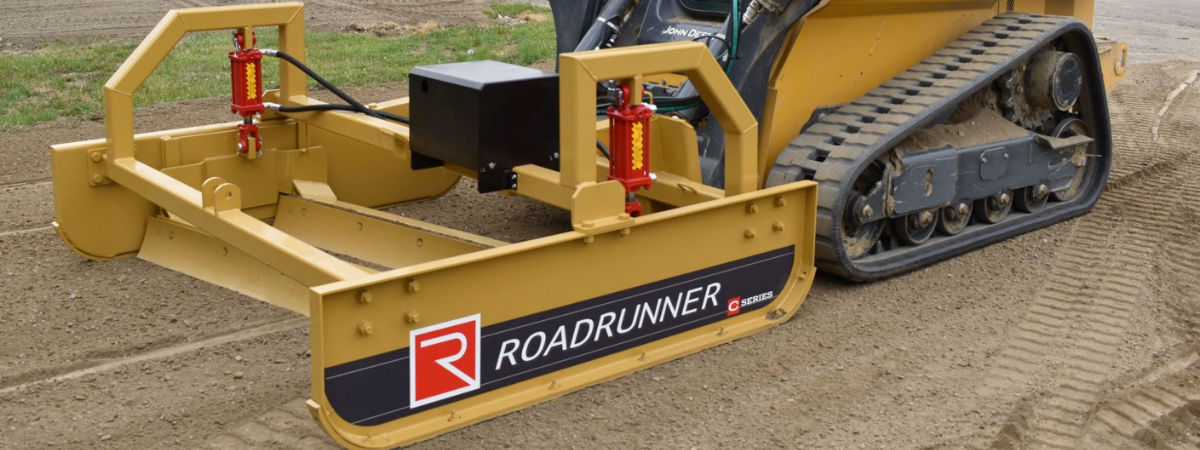
Credit: roadrunnerblade.com
Design And Functionality
The design and functionality of a Skid Steer Box Blade are crucial. It is made to handle various landscaping tasks. This tool is efficient for leveling, grading, and site preparation. Understanding its components helps in maximizing its use.
Blade Structure And Materials
The blade structure plays a key role in performance. The blade is typically made of high-strength steel. This material ensures durability and resistance to wear. Below are some key features of the blade structure:
- Thickness: Usually ½ inch for strength.
- Shape: Curved or flat blades for different tasks.
- Reinforcement: Extra ribs for added support.
Choosing the right material is essential. Steel is the most common choice. It withstands heavy loads and rough terrain.
Hydraulic Operation Mechanism
The hydraulic operation mechanism enhances the versatility of the box blade. It allows for easy adjustments to the blade angle and height. This feature is critical for achieving precise grading results.
| Feature | Benefit |
|---|---|
| Hydraulic Cylinders | Easy control over the blade’s position. |
| Quick Attach System | Fast attachment to the skid steer. |
| Variable Angling | Flexibility for different tasks. |
The hydraulic system is reliable and efficient. It saves time and effort during operation. With proper maintenance, it will last long and perform well.
Applications In Grading And Landscaping
The Skid Steer Box Blade is vital for grading and landscaping. It handles tasks like leveling, preparing sites, and more. This tool can transform land efficiently. Let’s explore its main applications.
Leveling Soil And Gravel
Leveling soil and gravel is crucial for landscaping. The Skid Steer Box Blade makes this task easy. Here’s how it works:
- Adjustable Blade: The blade height can be changed for various depths.
- Efficient Operation: It quickly removes bumps and fills holes.
- Uniform Surface: Creates a smooth finish for planting or paving.
With this tool, you can:
- Prepare land for grass or gardens.
- Make areas ready for driveways and paths.
- Ensure drainage flows properly.
Preparing Construction Sites
Preparing construction sites is another key application. A Skid Steer Box Blade ensures the area is ready for building. Here’s what it does:
- Clearing Debris: Removes rocks, roots, and old materials.
- Creating Flat Surfaces: Levels the ground for foundations.
- Establishing Grading: Ensures proper slope for drainage.
The benefits of using a box blade for construction include:
| Benefit | Description |
|---|---|
| Time Efficiency | Completes tasks faster than manual methods. |
| Cost-Effective | Reduces labor costs by streamlining the process. |
| Precision | Delivers accurate grading and leveling. |
Using a Skid Steer Box Blade prepares sites quickly. This helps keep projects on schedule.
Benefits Of Using A Skid Steer Box Blade
A Skid Steer Box Blade offers many benefits for landscaping and construction. It enhances efficiency and precision in various tasks. Understanding these benefits can help you make the best choice for your projects.
Time And Labor Savings
Using a Skid Steer Box Blade saves both time and labor costs. Here are some key points:
- Faster Operations: Complete tasks quickly.
- Reduced Labor Needs: Less manpower required for projects.
- Efficient Material Handling: Move dirt and gravel easily.
Time saved translates to increased productivity. This tool can cut project completion times significantly. Less labor means lower costs for you.
Precision And Versatility
The Skid Steer Box Blade excels in precision and versatility. Here’s how:
| Feature | Benefit |
|---|---|
| Adjustable Blade Angles | Achieve desired grading results. |
| Multiple Heights | Work on different terrain levels. |
| Material Compatibility | Handle soil, gravel, and more. |
This tool adapts to various tasks. From grading to leveling, the Skid Steer Box Blade fits your needs. Users enjoy precise control over their work.
Attachment Compatibility And Installation
Understanding the attachment compatibility and installation process for a Skid Steer Box Blade is essential. Proper attachment ensures efficient operation. It also enhances your machine’s versatility.
Connecting To Different Skid Steer Models
Skid Steer Box Blades work with various models. Compatibility varies based on the manufacturer and model year.
Check your skid steer’s specifications to ensure a proper fit. Here are some common models:
| Skid Steer Model | Attachment Compatibility |
|---|---|
| Bobcat S650 | Compatible with most standard box blades |
| CASE 570N | Requires specific attachment kits |
| Caterpillar 248D | Compatible with heavy-duty box blades |
Quick Attachment Systems
Many skid steers feature quick attachment systems. These systems simplify the installation process. They allow for fast and easy attachment changes.
- Universal Quick Attach: Fits most standard models.
- Pin-On Attachments: Secure with pins for stability.
- Manual Coupler: Requires manual adjustments.
To install, follow these steps:
- Align the box blade with the attachment plate.
- Secure the locking mechanism.
- Test for stability before use.
Regularly check connections for safety. Proper installation ensures optimal performance.
Maintenance Tips For Longevity
Keeping your Skid Steer Box Blade in top condition ensures it lasts longer. Regular maintenance prevents costly repairs. Follow these tips to maximize its lifespan.
Routine Inspection Checklist
Conducting regular inspections helps catch issues early. Here’s a simple checklist:
- Blade Condition: Check for cracks or wear.
- Mounting Hardware: Ensure bolts are tight and secure.
- Hydraulic System: Look for leaks and check fluid levels.
- Paint and Coating: Inspect for rust and touch up as needed.
- Hoses and Fittings: Check for wear and replace if damaged.
Replacing Wear Parts
Replace worn parts promptly. This keeps your box blade effective. Common wear parts include:
| Part | Signs of Wear | Replacement Frequency |
|---|---|---|
| Blades | Chipped or dull edges | Every 100 hours |
| Cutting Edge | Significant wear | Every 200 hours |
| Hydraulic Hoses | Cracks or leaks | Annually |
Regular part replacement saves time and money. Always use quality parts. This ensures better performance and longevity.
Safety Protocols And Best Practices
Using a Skid Steer Box Blade requires strict adherence to safety protocols. Proper training and precautions can prevent accidents. Understanding best practices ensures a safer work environment.
Operator Training
Proper training is vital for skid steer operators. Trained operators can handle machinery safely. They understand the equipment’s capabilities and limitations. Here are key training components:
- Understanding machine controls
- Recognizing blind spots
- Learning safe loading and unloading techniques
- Performing pre-operation checks
Consider certification programs for operators. These programs enhance knowledge and skills. Regular refresher courses keep training updated.
Worksite Precautions
Implementing worksite precautions increases safety. Follow these best practices:
- Conduct a site assessment before operation.
- Mark hazards clearly using cones or flags.
- Ensure proper lighting for visibility.
- Maintain a safe distance from bystanders.
- Always wear appropriate personal protective equipment (PPE).
Establish a clear communication plan among workers. Use hand signals or radios for effective communication. Regular safety meetings help reinforce these practices.
| Precaution | Description |
|---|---|
| Site Assessment | Identify potential hazards before starting work. |
| Hazard Marking | Use cones or flags to mark dangerous areas. |
| PPE | Wear helmets, gloves, and safety boots. |
Following these safety protocols ensures a safer work environment. Operators and workers can complete tasks without injury.
Case Studies: Real-world Success Stories
The Skid Steer Box Blade has transformed many landscapes. These case studies highlight real success stories. They showcase how this tool can change both residential and commercial areas.
Residential Landscaping Transformations
A family in Springfield wanted a beautiful yard. They faced uneven terrain and poor drainage. They used a Skid Steer Box Blade to level the land.
- Area Preparation: The blade smoothed out bumps and holes.
- Soil Distribution: It spread soil evenly for better growth.
- Drainage Improvement: It created proper slopes for water flow.
After the work, the yard looked stunning. The family added grass, flowers, and paths. Their outdoor space became perfect for gatherings.
Commercial Site Development
A construction company in Oakwood needed to prepare a site. They required a level area for new buildings. The Skid Steer Box Blade was the ideal solution.
| Task | Results |
|---|---|
| Clearing debris | Site ready for construction |
| Leveling ground | Uniform surface for foundations |
| Creating drainage | Prevented water pooling |
This project finished ahead of schedule. The site was ready for building in no time. The company saved both time and money, proving the effectiveness of the Skid Steer Box Blade.
Choosing The Right Box Blade For Your Skid Steer
Selecting the right box blade for your skid steer is crucial. The right choice boosts productivity and improves performance. Consider size, weight, and compatibility before making a purchase.
Size And Weight Considerations
Choosing the right size and weight for your box blade matters. A proper fit ensures efficient operation. Here are key factors to consider:
- Skid Steer Size: Match the box blade to your skid steer’s dimensions.
- Weight Capacity: Ensure your skid steer can handle the box blade’s weight.
- Blade Width: Wider blades cover more ground but need more power.
- Height: Ensure the blade can reach the desired grade.
Check the specifications of both the skid steer and box blade. This will help avoid compatibility issues.
Manufacturer And Model Compatibility
Compatibility between the skid steer and box blade is key. Not all blades fit every model. Consider these points:
- Brand: Stick to reputable brands known for quality.
- Model Number: Always check the model number for a perfect match.
- Attachment System: Ensure the attachment system fits your skid steer.
- Customer Reviews: Read reviews for insights on performance.
Using the correct box blade enhances efficiency. Avoid costly mistakes by verifying compatibility before purchase.
Economic Considerations And Roi
Investing in a skid steer box blade can impact your budget. Understanding the economic factors is vital. A solid ROI ensures you maximize your investment. Explore the costs involved and your options for rental or purchase.
Cost-benefit Analysis
Performing a cost-benefit analysis helps clarify financial gains. Consider these factors:
- Initial Cost: The purchase price of the box blade.
- Maintenance: Regular upkeep costs can add up.
- Operational Efficiency: Time saved on projects translates to money saved.
- Durability: A high-quality blade can last longer, reducing replacement costs.
Here’s a simple table to visualize potential savings:
| Factor | Estimated Cost | Benefits |
|---|---|---|
| Initial Purchase | $3,000 | Long-term asset |
| Annual Maintenance | $500 | Ensures optimal performance |
| Time Saved | $2,000 | Increased productivity |
Analyze these figures carefully. The better you understand your costs, the more informed your decisions become.
Rental Vs. Purchase Options
Deciding between renting or purchasing a skid steer box blade is crucial. Each option has its own benefits:
- Rental:
- Lower upfront costs.
- Flexibility for short-term projects.
- No maintenance responsibilities.
- Purchase:
- Long-term investment.
- Full control over the equipment.
- Potential for resale value.
Consider your project duration and frequency. This helps in determining the best option. Calculate your total costs over time for both rental and purchase.
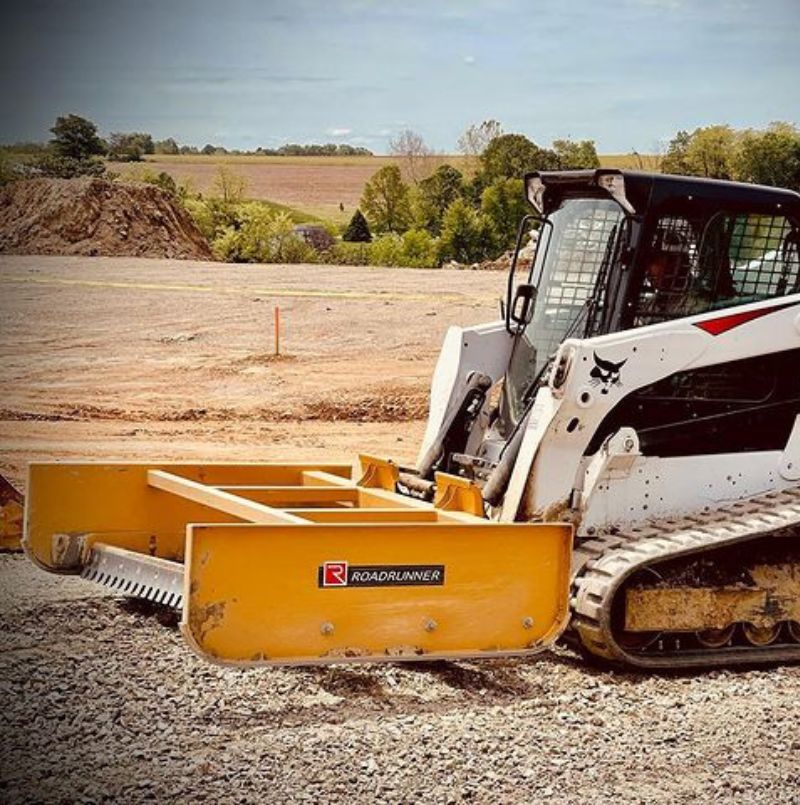
Credit: skidsteersdirect.com
Frequently Asked Questions
What Is A Skid Steer Box Blade?
A skid steer box blade is an attachment designed for skid steer loaders. It is primarily used for grading, leveling, and moving material. The box blade features adjustable sides and a rear blade, making it versatile for various landscaping and construction tasks.
It enhances efficiency and precision in work.
How Do You Use A Skid Steer Box Blade?
To use a skid steer box blade, attach it securely to your skid steer. Adjust the height and angle as needed. Start by moving forward slowly to grade the surface. You can also use it in reverse for finer adjustments.
Practice makes perfect for achieving the best results.
What Are The Benefits Of Using A Box Blade?
Using a box blade provides several benefits. It allows for precise grading and leveling of surfaces. The adjustable features enable versatility in various tasks. Additionally, it saves time and labor compared to manual methods. This attachment can significantly improve your landscaping or construction project efficiency.
Can A Box Blade Be Used For Different Materials?
Yes, a skid steer box blade can handle various materials. It is effective for soil, gravel, and even light debris. Depending on the project, you can adjust the blade height and angle. This adaptability makes it a valuable tool for landscaping and construction tasks.
Conclusion
Choosing the right skid steer box blade can transform your landscaping and grading projects. These versatile tools offer precision and efficiency. With the right knowledge, you can maximize their benefits. Invest wisely, and you’ll see significant improvements in your work.
Embrace the power of a skid steer box blade today!



